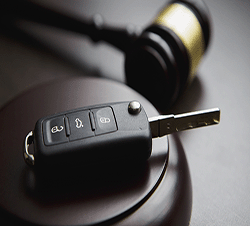Michigan Traffic Court Records Search
How to Run a Michigan Traffic Court Records Search
Navigating the Michigan Traffic Court system can be a bit overwhelming, especially if you are unfamiliar with traffic laws and how to fight your traffic ticket. Understanding the basics of how traffic court cases are handled can be helpful if you need to go to court for a citation you've received.
If you go to court and win your traffic court case, then your Michigan traffic court record will be wiped from your driver history. However if you are found guilty then you will receive a criminal infraction, which is essentially a criminal record. In some more serious cases, those dealing with reckless driving or a DUI, those citations can lead to misdemeanors or even a felony on your criminal record.
Moving Violations in Michigan Are Criminal Records
Michigan classifies traffic citations, also known as moving violations, into two main categories: civil infractions and misdemeanors. Civil infractions include minor offenses such as speeding or running a stop sign and usually result in fines. Misdemeanors, on the other hand, are more serious offenses that can carry heavier penalties, including jail time. In the most serious of cases, a felony can be issued, such as a DUI that led to an accident where someone was injured. All of these will appear on a background check which will be referenced as a criminal driving offense.
Civil Infractions: When you receive a moving violation for a civil infraction such as a speeding citation, you have a few of options. You can claim responsibility and pay the traffic citation fine, admit responsibility with an explanation, or deny responsibility and request a hearing. If you choose to contest the moving violation, a court hearing will be scheduled where you can present your case.
Misdemeanors: For misdemeanor moving violations, you'll likely be required to appear in court. You have the right to obtain legal representation. Depending on the seriousness of your case, you may consider hiring an attorney who specializes in traffic laws. This can potentially help navigate the process and potentially minimize penalties, especially in a case involving a DUI or reckless driving.
How to Schedule Your Michigan Traffic Court Hearing
When contesting a moving violation in Michigan, you will need to attend a court hearing at the district level. During your traffic court hearing, both you and the officer who issued the ticket will have a chance to present evidence and testimony. After considering the evidence, the presiding judge will decide if you won or lost this case. If you lose the case then you'll be responsible for the fines and any penalties.
The Impact of Moving Violations on Your Driving Record and Insurance
Getting a moving violation can impact your driving record, resulting in points that can lead to increased insurance premiums and, in some cases, the suspension of your driver's license. It's important to understand the potential long-term consequences of these violations and to take them seriously. Michigan traffic school is an option for those that want to have point removed from their driving record. You can do this once every 18 months to remove one point from your record.


